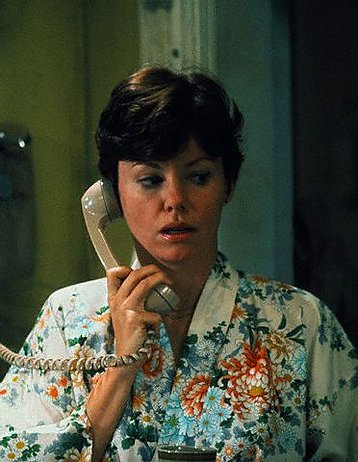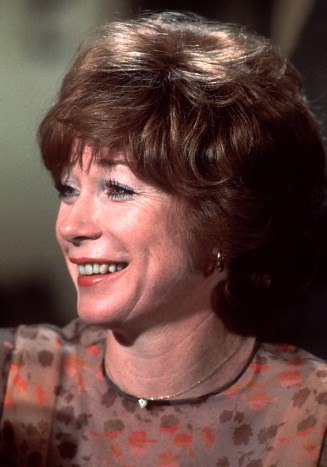
Just as a start, I'd just like to say that it's an honour to write my 100th review about a really iconic performance. So the 100th reviewed work is...
Diane Keaton received her first Best Actress nomination and only Oscar to date for playing Annie Hall, the love interest of a neurotic comedian in Woody Allen's classic, Best Picture winner movie, the fabulous Annie Hall. I think that Diane Keaton's win in 1977 was pretty much what we call nowadays a lock. She had the support of the critics, the audience loved her and the movie, she won the Globe, she gave two acclaimed performances in 1977, she was the star of The Godfather movies. In short, 1977 was Diane Keaton's year, like with Kate Winslet in 2008 and yes, Sandra Bullock in 2009.
What can I say about it Annie Hall? Maybe that it's my favorite movie of all time or that it made both Woody Allen and Diane Keaton icons. Or that it's full of brilliant lines, it has a fascinating story, brilliant directing and great acting. It received five nominations and I don't think that it had a sure Best Picture win. I'm glad it won, though. Sometimes the Academy can get it really right. And they made one of their best decisions here. Woody Allen gives an excellent performance that might be annoying but I think that was the point.
Diane Keaton as an actress is such an interesting case. On the one hand, she's superbly talented and she's always such a radiant, luminous presence on the screen. I just couldn't imagine Father of the Bride without her smile (OK, so what? I love that movie) and eyes. I mean there's a scene there when she goes down the stairs on the wedding day of her daughter. Steve Martin says that she's just as beautiful as she was when he met her. And I totally believe that she's the most beautiful person for him. Sweet Diane has this luminous, unique personality which shines through the most shallow scripts. On the other hand, we have her later works and awful choices but she's still able to put on a great performance once in a while. I'm feeling towards Natalie Portman feels about her. She can do anything as she's the best.

Who can deny that Annie Hall is Diane Keaton (she's indeed Annie Hall)? However, an interesting thought came to this time: isn't it that we just identify this character with her because she just totally became Annie Hall. I've already written about this in my review about Ingrid Bergman in Autumn Sonata. The actress inhabits the role so much that it becomes her after all and one just cannot decide which part is the actress and which part is the character. This kind of brilliance is so dazzling and it gives a certain kind of mystery to the role.
As I'm writing this review, I'm just trying to really consider my words. I want every word and sentence to become perfect (which is impossible) and I just don't want to sound phony. Not for a second. I don't want to be the guy in the line at the cinema. I don't want to use these huge and very noble words because Diane's performance is just so damn natural and it lacks every phoniness. It's just so full of almost ridiculous honesty. This performance is just like a masterfully composed concerto. There's no false note in it and some little touches are so evocative in it. I love that whenever I look at Annie/Diane, something good comes to my mind and I just really forget everything that bothers me. It can be anything, Annie Hall and Diane stands there firmly and she's there to catch me when I want to jump and she does so with her loveliness, charm and optimism. Like me, like all of us, Annie has her ups and downs and Keaton does so very well at showing all the changes of this fascinating, beautiful character made of pure love. As she is made of love. Woody Allen wrote Annie with love, Diane played her with love. I feel that Diane certainly enjoyed the part of Annie and it's so wonderful to see someone so cool and confident on screen. Diane is NEVER a phony for one simple reason: she cares about Annie, she loves Annie enough to avoid the traps. Because Annie deserves it.
I don't know if there's anyone in this world who can resist her when she sings la-di-da. I mean, the whole beginning of her performance is so ditzy and crazy and every once in a while we all love being a little crazy. And anyone who's not cracked up by the driving of Annie is a totally humorless human being. Diane's comic delivery is just golden here. OH MY GOD! THERE'S A PARKING PLACE! And you just hear the breaks. It's so impossible not to fall in love with Diane here. Diane made the impossible happen: we are amazed by her because we don't become her. Instead, we become Alvy Singer and we fall in love with Annie along with Alvy over and over again, every time we watch her. And after that it's just impossible not to love her. Wheter she says that we are what Grammy Hall would call a real Jew or when she's laughing at the death of her uncle. Who the hell cares? Who cares if she's singing and no one else is listening to her? We actually DO listen to her. I might add that Diane's singing is simply the best: I mean she's no Édith Piaf, but still. It's just her.
And there comes the best delivered line ever on the silver screen. "There's a spider in the bathroom. There's a big, black spider in the bathroom." Diane was able to deliver the most inappropriate and crazy sentece about chocolate milk fit so properly as if it was the most important piece of news. Nothing (and by nothing, I really mean NOTHING) forced comes out of Diane's mouth. Although it's true that she works with the best screenplay ever written, she still nails every nuance in it. Everything is just dead on.

Diane developed the character of Annie so perfectly (I think it should be taught in acting classes. Or it is probably). Annie becomes a free-thinking, independant woman from a naive, free-spirited, ditzy Chippewa Falls girl. Annie becomes educated and she simply outgrows Alvy. Diane shows the most heartbreaking and dramatic aspect of this character so thrillingly that it almost gives me tears: Annie loves Alvy but she simply doesn't need him anymore. I think that many people do not give enough credit to that Los Angeles scene with her. She's criticised that she isn't great as a Californian girl. But damn it, she doesn't have to be a Californian girl and she really feels like a fish out of water. Diane is so heartbreaking there: somehow I always felt that she wanted to go to New York (later she moves back to New York). Or I just really cared about the character. That's possible. However I still stand firmly by the opinion that Diane's performance is not only that funny, luminous acting you experience for the first time. There's a certain bitterness to it, which I haven't recognised before but having scene the movie at least fifteen times, I still have a lot to explore in Annie as Diane Keaton added millions of layers to her. She's just so complicated.
Some consider Diane Keaton's win for Annie Hall a love letter to Diane herself, the character and the movie and they think that the Best Actress Oscar win wasn't about the actual performance. While I agree with the first part, I still have to add something: her win and my review is indeed a love letter to Annie Hall (the character and the movie) and Diane Keaton's brilliant, hilarious, radiant, beautiful, heartbreaking, luminous, fantastic and unforgettable performance.
A rating would be so pathetic in the end. I don't want to do it this time. This experience was nothing that I can measure with my Meryls.
I've done it! 100 reviews!
But still. Just to ruin everything, down here as my mistake:















